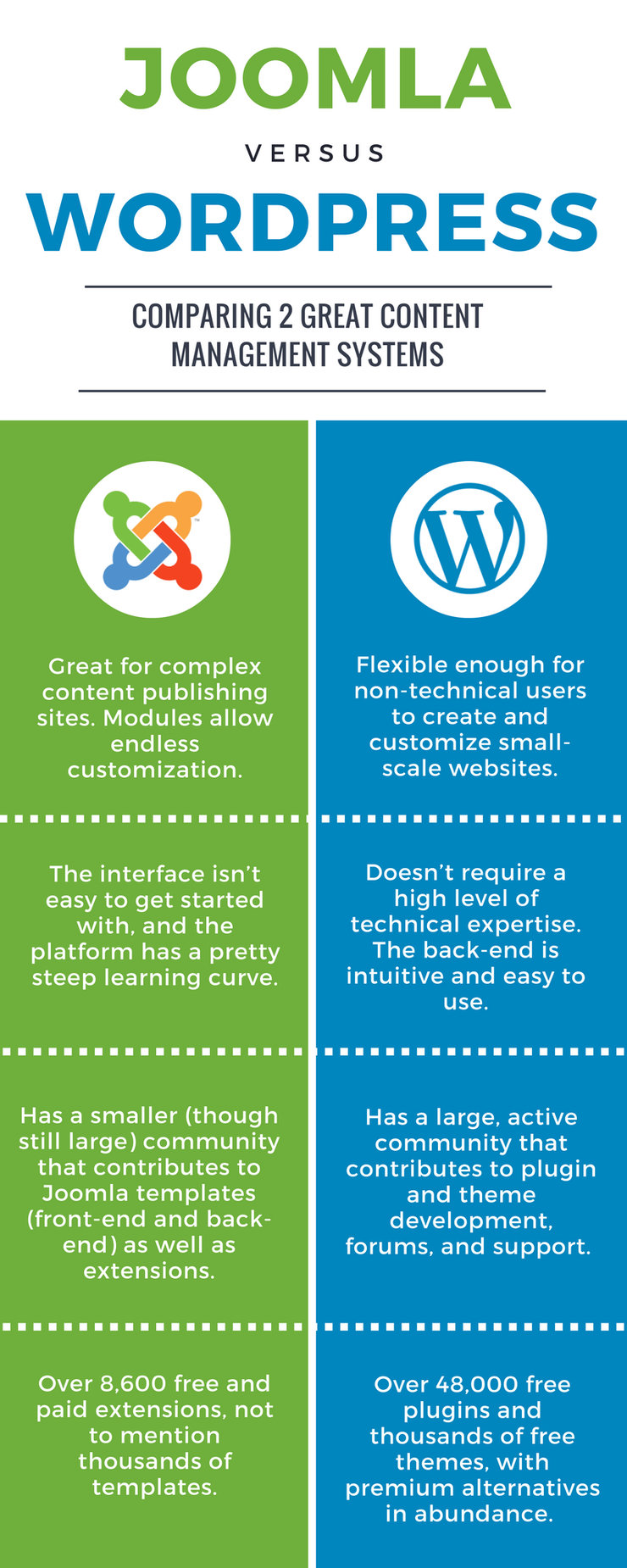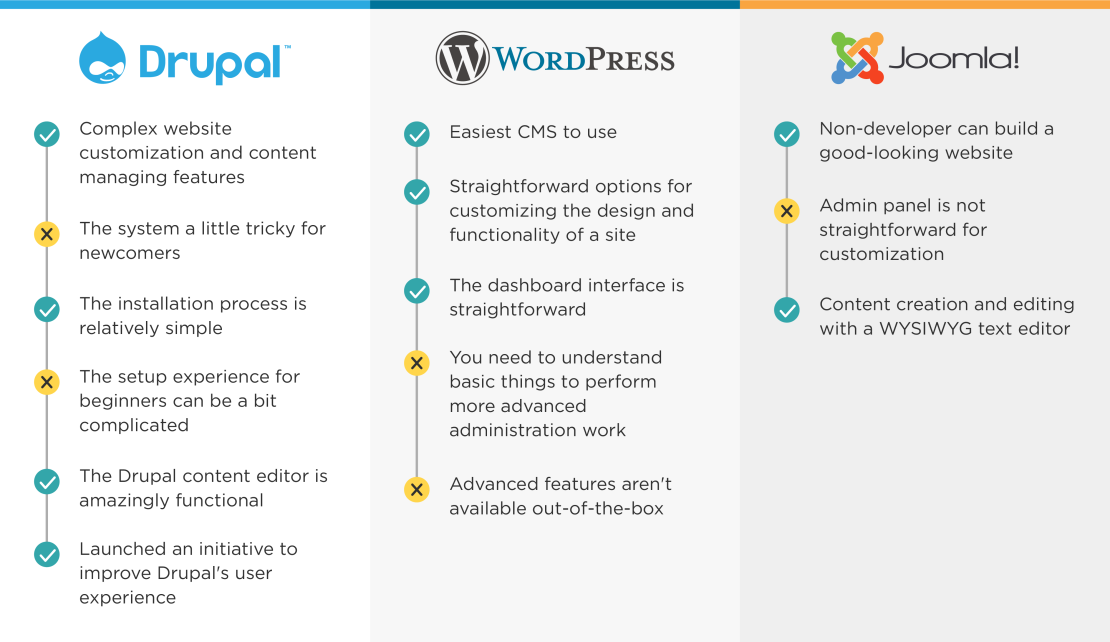Difference Between WordPress and Joomla: WordPress and Joomla are popular content management systems (CMS). WordPress boasts simplicity, making it perfect for beginners and bloggers. Its vast array of plugins and themes allows for extensive customization. On the other hand, Joomla offers more flexibility for developers and advanced users.
It features powerful extensions and is suitable for complex websites. Both platforms are open-source and have strong community support. Choosing between them depends on your experience level and website needs. WordPress excels in ease of use, while Joomla stands out in customization and scalability. Each CMS has unique strengths, catering to different projects and user expertise.
Introduction To WordPress And Joomla
Both WordPress and Joomla are popular content management systems (CMS) that help users create websites without coding. However, they have different features and uses. Let’s explore their backgrounds and philosophies.
Historical Background
WordPress began as a blogging platform in 2003 and quickly evolved. Today, it powers 40% of the web. Joomla, on the other hand, started in 2005 as a fork of the Mambo CMS project and became popular for its flexibility.
| WordPress | Joomla |
|---|---|
| Launched in 2003 | Launched in 2005 |
| Started as a blogging tool | Forked from Mambo CMS |
| Powers 40% of the web | Known for flexibility |
Core Philosophy
WordPress focuses on ease of use. It’s user-friendly and offers many themes and plugins. Beginners find it simple. Joomla, though, focuses on flexibility and power. It offers more control over content and suits developers and advanced users.
- WordPress: Easy to use, with many themes and plugins.
- Joomla: Flexible, offers more control, and suits advanced users.

User Interface And Experience
Choosing between WordPress and Joomla often comes down to the user interface and experience. Both platforms offer unique dashboards and ways to interact with the system. Understanding these differences helps users make an informed decision. Let’s dive into the details.
Dashboard Layout
WordPress features a clean and simple dashboard. It is designed for ease of use with beginners in mind. The left-hand sidebar includes key options like Posts, Media, Pages, and Settings. Each section is easy to navigate. Users can access everything with a few clicks.
Joomla’s dashboard is more complex. It provides extensive options and menus. The control panel has multiple sections such as Content, Structure, and Users. This layout appeals to advanced users who need more control. It might feel overwhelming for beginners.
Ease Of Use
WordPress is known for its user-friendly interface. Setting up a website is straightforward. The platform offers a step-by-step setup wizard. Users can easily manage content, plugins, and themes.
Joomla, on the other hand, has a steeper learning curve. The platform provides more flexibility and customization. This makes it powerful but less intuitive. Users may need to read tutorials or guides to understand the features fully.
| Feature | WordPress | Joomla |
|---|---|---|
| Dashboard Layout | Simple and clean | Complex and detailed |
| Ease of Use | Beginner-friendly | Steeper learning curve |
| Customization | Limited but easy | Extensive but challenging |
Both WordPress and Joomla offer distinct user experiences. WordPress is ideal for beginners and small businesses. Joomla suits advanced users who need more control. Choose the platform that meets your needs.
Customization And Flexibility
WordPress and Joomla offer strong customization and flexibility options. Users can tailor their websites to their specific needs. Both platforms use themes, templates, plugins, and extensions. Yet, they handle these elements differently.
Themes And Templates
WordPress provides thousands of themes. These themes range from free to premium. Users can easily change the look and feel of their site. They can do this with just a few clicks. WordPress themes are highly customizable. Users can tweak the design with built-in options.
Joomla also offers templates. These templates can change the appearance of a site. Users may need some coding skills to make advanced changes. Joomla templates are less intuitive than WordPress themes. But they offer more control for those with technical skills.
| Feature | WordPress | Joomla |
|---|---|---|
| Ease of Use | High | Moderate |
| Customization Options | Many | Extensive |
Extensions And Plugins
WordPress boasts a vast library of plugins. These plugins can add features to a site. Users can find plugins for SEO, security, and more. Installing and activating plugins is simple. Beginners can use them without hassle.
Joomla uses extensions to enhance functionality. These extensions include plugins, modules, and components. Joomla’s extension library is smaller than WordPress. But it offers powerful options. Users may need basic coding knowledge for complex extensions.
- WordPress Plugins: Many options, user-friendly, easy to install.
- Joomla Extensions: Fewer options, more control, requires coding.

Credit: www.nimbusthemes.com
Security And Support
Choosing a content management system (CMS) involves considering security and support. Both WordPress and Joomla have unique strengths. Let’s dive into their built-in security features and available support resources.
Built-in Features
WordPress provides basic security out of the box. It includes automatic updates for core files. Users can enhance security with plugins like Wordfence and Sucuri. WordPress also supports two-factor authentication (2FA) and SSL certificates.
Joomla offers robust security features. It includes two-factor authentication and extensive access control levels (ACL). Joomla has built-in security settings that can be easily configured. Both platforms have strong development teams that release patches regularly.
Community And Resources
WordPress boasts a vast community. It has numerous forums and documentation. Users can access help from developers and enthusiasts. The WordPress Codex and support forums are rich in resources.
Joomla has a dedicated user base. Its community is smaller but very active. Joomla forums and user groups provide extensive support. The Joomla Documentation Wiki is a great resource for troubleshooting.
| Feature | WordPress | Joomla |
|---|---|---|
| Automatic Updates | Yes | Yes |
| Two-Factor Authentication (2FA) | With Plugins | Built-in |
| Access Control Levels (ACL) | With Plugins | Built-in |
| Community Size | Very Large | Moderate |
| Documentation | Extensive | Comprehensive |

Frequently Asked Questions
Which One Is Better, Joomla Or WordPress?
WordPress is generally better for beginners due to its ease of use. Joomla offers more flexibility for advanced users. Choose based on your technical skills and project needs.
Does Anyone Use Joomla Anymore?
Yes, Joomla is still used by many. It’s popular for creating websites and online applications. Joomla offers robust security, flexibility, and a large community. Businesses, developers, and non-profits continue to rely on Joomla for their web projects.
What Are The Disadvantages Of Joomla?
Joomla has a steep learning curve, making it challenging for beginners. Extensions can be costly. It is limitedly compatible with certain plugins and themes. Frequent updates can disrupt functionality. It is also less SEO-friendly compared to WordPress.
Why Do People Use Joomla?
People use Joomla for its flexibility, ease of use, and powerful content management features. It supports multilingual sites, has strong community support, and offers extensive extensions.
Conclusion
Choosing between WordPress and Joomla depends on your specific needs. WordPress is user-friendly and great for beginners. Joomla offers more flexibility and advanced features for experienced users. Both platforms have unique strengths. Evaluate your goals and skill level to choose your website best.


